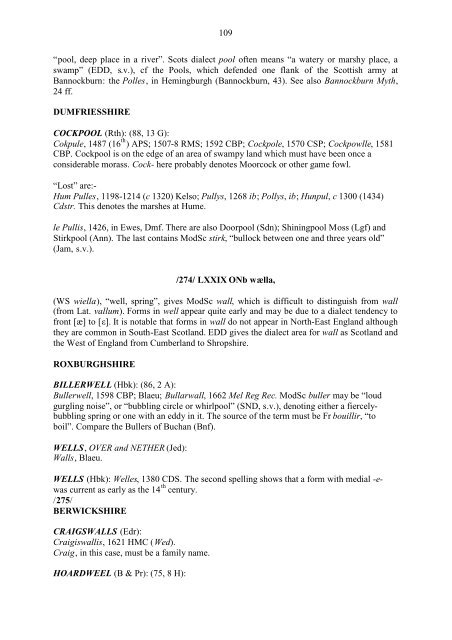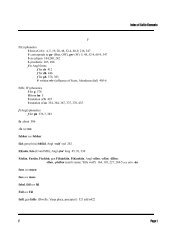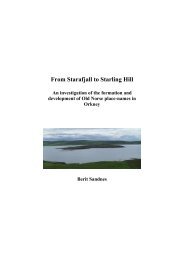May Williamson: The Non-Celtic Place-Names of the Scottish Border ...
May Williamson: The Non-Celtic Place-Names of the Scottish Border ...
May Williamson: The Non-Celtic Place-Names of the Scottish Border ...
You also want an ePaper? Increase the reach of your titles
YUMPU automatically turns print PDFs into web optimized ePapers that Google loves.
109<br />
“pool, deep place in a river”. Scots dialect pool <strong>of</strong>ten means “a watery or marshy place, a<br />
swamp” (EDD, s.v.), cf <strong>the</strong> Pools, which defended one flank <strong>of</strong> <strong>the</strong> <strong>Scottish</strong> army at<br />
Bannockburn: <strong>the</strong> Polles, in Hemingburgh (Bannockburn, 43). See also Bannockburn Myth,<br />
24 ff.<br />
DUMFRIESSHIRE<br />
COCKPOOL (Rth): (88, 13 G):<br />
Cokpule, 1487 (16 th ) APS; 1507-8 RMS; 1592 CBP; Cockpole, 1570 CSP; Cockpowlle, 1581<br />
CBP. Cockpool is on <strong>the</strong> edge <strong>of</strong> an area <strong>of</strong> swampy land which must have been once a<br />
considerable morass. Cock- here probably denotes Moorcock or o<strong>the</strong>r game fowl.<br />
“Lost” are:-<br />
Hum Pulles, 1198-1214 (c 1320) Kelso; Pullys, 1268 ib; Pollys, ib; Hunpul, c 1300 (1434)<br />
Cdstr. This denotes <strong>the</strong> marshes at Hume.<br />
le Pullis, 1426, in Ewes, Dmf. <strong>The</strong>re are also Doorpool (Sdn); Shiningpool Moss (Lgf) and<br />
Stirkpool (Ann). <strong>The</strong> last contains ModSc stirk, “bullock between one and three years old”<br />
(Jam, s.v.).<br />
/274/ LXXIX ONb wælla,<br />
(WS wiella), “well, spring”, gives ModSc wall, which is difficult to distinguish from wall<br />
(from Lat. vallum). Forms in well appear quite early and may be due to a dialect tendency to<br />
front [æ] to [ε]. It is notable that forms in wall do not appear in North-East England although<br />
<strong>the</strong>y are common in South-East Scotland. EDD gives <strong>the</strong> dialect area for wall as Scotland and<br />
<strong>the</strong> West <strong>of</strong> England from Cumberland to Shropshire.<br />
ROXBURGHSHIRE<br />
BILLERWELL (Hbk): (86, 2 A):<br />
Bullerwell, 1598 CBP; Blaeu; Bullarwall, 1662 Mel Reg Rec. ModSc buller may be “loud<br />
gurgling noise”, or “bubbling circle or whirlpool” (SND, s.v.), denoting ei<strong>the</strong>r a fiercelybubbling<br />
spring or one with an eddy in it. <strong>The</strong> source <strong>of</strong> <strong>the</strong> term must be Fr bouillir, “to<br />
boil”. Compare <strong>the</strong> Bullers <strong>of</strong> Buchan (Bnf).<br />
WELLS, OVER and NETHER (Jed):<br />
Walls, Blaeu.<br />
WELLS (Hbk): Welles, 1380 CDS. <strong>The</strong> second spelling shows that a form with medial -ewas<br />
current as early as <strong>the</strong> 14 th century.<br />
/275/<br />
BERWICKSHIRE<br />
CRAIGSWALLS (Edr):<br />
Craigiswallis, 1621 HMC (Wed).<br />
Craig, in this case, must be a family name.<br />
HOARDWEEL (B & Pr): (75, 8 H):




